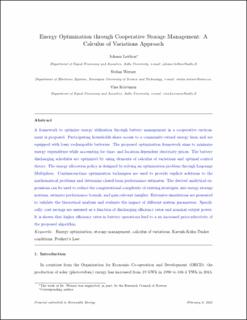| dc.contributor.author | Leithon, Johann | |
| dc.contributor.author | Werner, Stefan | |
| dc.contributor.author | Koivunen, Visa | |
| dc.date.accessioned | 2021-03-17T07:23:16Z | |
| dc.date.available | 2021-03-17T07:23:16Z | |
| dc.date.created | 2021-03-15T19:44:17Z | |
| dc.date.issued | 2021 | |
| dc.identifier.citation | Renewable Energy. 2021, 171, 1357-1370. | en_US |
| dc.identifier.issn | 0960-1481 | |
| dc.identifier.uri | https://hdl.handle.net/11250/2733789 | |
| dc.description.abstract | A framework to optimize energy utilization through battery management in a cooperative environment is proposed. Participating households share access to a community-owned energy farm and are equipped with lossy rechargeable batteries. The proposed optimization framework aims to minimize energy expenditure while accounting for time- and location-dependent electricity prices. The battery discharging schedules are optimized by using elements of calculus of variations and optimal control theory. The energy allocation policy is designed by solving an optimization problem through Lagrange Multipliers. Continuous-time optimization techniques are used to provide explicit solutions to the mathematical problems and determine closed-form performance estimates. The derived analytical expressions can be used to reduce the computational complexity of existing strategies, size energy storage systems, estimate performance bounds, and gain relevant insights. Extensive simulations are presented to validate the theoretical analysis and evaluate the impact of different system parameters. Specifically, cost savings are assessed as a function of discharging efficiency rates and nominal output power. It is shown that higher efficiency rates in battery operations lead to an increased price-selectivity of the proposed algorithm. | en_US |
| dc.language.iso | eng | en_US |
| dc.publisher | Elsevier | en_US |
| dc.rights | Attribution-NonCommercial-NoDerivatives 4.0 Internasjonal | * |
| dc.rights.uri | http://creativecommons.org/licenses/by-nc-nd/4.0/deed.no | * |
| dc.title | Energy optimization through cooperative storage management: A calculus of variations approach | en_US |
| dc.type | Peer reviewed | en_US |
| dc.type | Journal article | en_US |
| dc.description.version | acceptedVersion | en_US |
| dc.source.pagenumber | 1357-1370 | en_US |
| dc.source.volume | 171 | en_US |
| dc.source.journal | Renewable Energy | en_US |
| dc.identifier.doi | https://doi.org/10.1016/j.renene.2021.02.093 | |
| dc.identifier.cristin | 1898196 | |
| dc.description.localcode | © 2020. This is the authors’ accepted and refereed manuscript to the article. Locked until 6 March 2023 due to copyright restrictions. This manuscript version is made available under the CC-BY-NC-ND 4.0 license http://creativecommons.org/licenses/by-nc-nd/4.0/ | en_US |
| cristin.ispublished | true | |
| cristin.fulltext | postprint | |
| cristin.qualitycode | 1 | |

